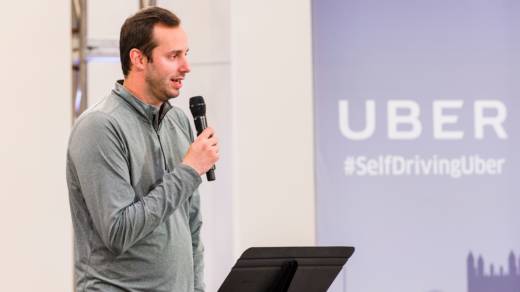Waymo's accusations center on LiDAR — essentially, the technology that allows self-driving vehicles to see the world around them by using lasers to shape an evolving 3-D image of other objects on the road. Waymo says it invested millions of dollars and thousands of hours to develop its advanced and cost-effective LiDAR sensors.
Waymo says Levandowski, who worked as a manager in its self-driving car project, downloaded nearly 10 gigabytes of data — more than 14,000 files — and attached an external hard drive to his company computer. A big chunk of that data, Waymo says, was related to LiDAR technology — including "confidential specifications for each version of every generation of Waymo's LiDAR circuit boards," the company says.
In its lawsuit, Waymo also says its former employees who left to join Levandowski's new venture brought proprietary information with them.
"These secrets included confidential supplier lists, manufacturing details and statements of work with highly technical information," the company says in its complaint, "all of which reflected the results of Waymo's months-long, resource-intensive research into suppliers for highly specialized LiDAR sensor components."
LiDAR is also at the heart of an email that seems to have been sent to Waymo by mistake by a vendor who copied the company on a message to Uber.
From the complaint filed in U.S. District Court:
"Waymo was recently – and apparently inadvertently – copied on an email from one of its LiDAR component vendors. The email attached machine drawings of what purports to be an Uber LiDAR circuit board. This circuit board bears a striking resemblance to Waymo's own highly confidential and proprietary design and reflects Waymo trade secrets."
Waymo accuses Levandowski of attempting to conceal his activity in the Waymo design server, saying that he installed a new operating system on his company-issued laptop in an attempt to wipe the laptop clean — and that after that activity, he only used the laptop again for a few minutes.
Here's the rough timeline of events Waymo alleges in its court filing:
- Dec. 11, 2015: Using special software, Levandowski downloads more than 14,000 files. Seven days later, he reformats the laptop.
- Jan. 14, 2016: Levandowski attends a high-level meeting at Uber's headquarters, according to Waymo.
- Jan 15, 2016: Levandowski forms a new venture called 280 Systems, which will later becomes OttoMotto.
- Jan. 27, 2016: Levandowski resigns from Waymo without notice, the company says.
- Feb. 1, 2016: Otto Trucking is officially formed.
- August 18, 2016: Uber announces deal to acquire Otto — "shortly after Mr. Levandowski received his final multi-million-dollar payment from Google," Waymo notes.
- Dec. 13, 2016: Waymo receives an errant email from a LiDAR-component vendor, including an attached image of a circuit board that Waymo says strongly resembles its "highly confidential current-generation LiDAR circuit board."
- Feb. 9, 2016: Waymo receives documents from Nevada regulatory authorities that show Otto mentioned an "[i]n-house custom built 64-laser" LiDAR system that it said it had developed shortly before being acquired by Uber.
Along the way, Otto and Uber marked two high-profile milestones. Last September, Uber enacted a pilot program using self-driving cars in Pittsburgh. And in October, Otto performed what was called "the world's first autonomous truck delivery" in Colorado.
While at Google, Anthony Levandowski was widely regarded as a star, a gifted engineer with a knack for integrating his work into the real world. The Ghost Rider robotic motorcycle he led the development of now belongs to the Smithsonian. He joined Google back in 2007 — and in 2013, a New Yorker profile said of him, "Levandowski is equal parts idealist and voracious capitalist. He wants to fix the world and make a fortune doing it."
When that article was published, Levandowski worked at Google X, the company's experimental lab. It's unclear how the current dispute might affect his reputation.
Waymo's lawsuit is the latest in a series of dramatic shifts in the relationship between Alphabet and Uber. Back in 2013, Google Ventures invested more than $250 million in the car service. At the same time, David Drummond, an Alphabet executive in corporate development, joined Uber's board — but he stepped down last summer, as the companies' roles as competitors became clear.
Last month, Uber hired Amit Singhal, a former Google executive who led the company's search unit before retiring one year ago.
Copyright 2017 NPR. To see more, visit http://www.npr.org/.
9(MDAxOTAwOTE4MDEyMTkxMDAzNjczZDljZA004))

9(MDAxOTAwOTE4MDEyMTkxMDAzNjczZDljZA004))
